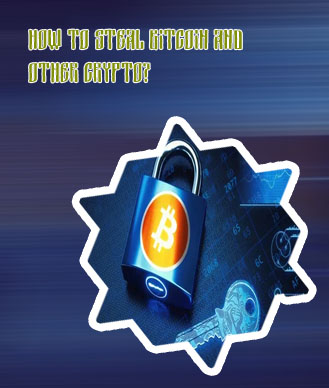
| Join | Login | ||

|
Why won cracking bitcoin wallets |
|
|
Bitcoin wallets are a popular target for hackers due to the potential financial gain associated with accessing them. Understanding why these wallets are prone to cracking is essential in order to protect your cryptocurrency investments. In order to shed light on this issue, we have compiled a list of 4 informative articles that delve into the reasons behind the vulnerability of Bitcoin wallets and provide strategies to enhance their security. The Anatomy of Bitcoin Wallet Cracking: How Hackers Exploit Weaknesses
Bitcoin wallets have increasingly become a target for hackers looking to exploit vulnerabilities and gain access to users' digital assets. In this comprehensive guide, the process of cracking Bitcoin wallets is dissected, shedding light on the various techniques employed by hackers to compromise security. The article delves into the anatomy of Bitcoin wallet cracking, highlighting the weak points that hackers exploit to gain unauthorized access. From phishing attacks and social engineering to brute force attacks and malware, hackers employ a variety of methods to compromise the security of Bitcoin wallets. By understanding these vulnerabilities, users can take proactive measures to protect their digital assets and minimize the risk of falling victim to malicious attacks. One key takeaway from the article is the importance of implementing robust security measures to safeguard Bitcoin wallets. This includes using secure passwords, enabling two-factor authentication, and regularly updating software to patch known vulnerabilities. Additionally, users are advised to exercise caution when sharing sensitive information online and to avoid clicking on suspicious links or downloading unknown files. In conclusion, ""The Anatomy of Bitcoin Wallet Cracking: How Hackers Exploit Weaknesses"" serves as a valuable resource for users looking to enhance the security of their Bitcoin wallets. By being aware of the tactics employed by hackers and taking proactive steps to protect their assets, users can mitigate the risk of falling victim to Protecting Your Bitcoin Wallet: Tips and Best Practices to Prevent Unauthorized AccessIn the fast-paced world of cryptocurrency, safeguarding your bitcoin wallet is paramount to protecting your digital assets from unauthorized access. With the rise in cyber attacks and hacking incidents, it is crucial to implement best practices to ensure the security of your investments. One key tip to enhance the security of your bitcoin wallet is to enable two-factor authentication (2FA). By adding an extra layer of protection, 2FA requires not only a password but also a secondary verification method, such as a code sent to your mobile device. This significantly reduces the risk of unauthorized access to your wallet. Another important practice is to regularly update your wallet software. Developers frequently release updates to address security vulnerabilities and improve functionality. By staying up to date with the latest versions, you can ensure that your wallet is equipped with the most effective security measures. Additionally, it is advisable to store your private keys securely offline. Consider using a hardware wallet or a paper wallet to keep your keys safe from online threats. By keeping your keys offline, you can minimize the risk of them being compromised by malicious actors. In conclusion, protecting your bitcoin wallet is crucial in the world of cryptocurrency. By following these tips and best practices, you can safeguard your digital assets and prevent unauthorized access to your funds. Stay informed and proactive in securing Common Mistakes That Make Bitcoin Wallets Vulnerable to HackingBitcoin wallets are essential tools for storing and managing cryptocurrencies, but they can also be vulnerable to hacking if proper precautions are not taken. One of the most common mistakes that users make is failing to secure their private keys. Private keys are used to access and manage your Bitcoin holdings, and if they fall into the wrong hands, your funds could be stolen. Another common mistake is using an insecure internet connection when accessing your wallet. Public Wi-Fi networks and unsecured websites can be easily compromised by hackers, putting your Bitcoin at risk. It's important to only access your wallet on secure networks and websites to minimize the chances of hacking. Additionally, not keeping your wallet software up to date can leave you vulnerable to security breaches. Developers regularly release updates to fix bugs and vulnerabilities, so it's crucial to install these updates promptly to protect your funds. In conclusion, protecting your Bitcoin wallet from hacking requires diligence and attention to detail. By securing your private keys, using secure internet connections, and keeping your wallet software updated, you can reduce the risk of falling victim to hackers and safeguard your cryptocurrency investments. Feedback from John Smith, a resident of London, UK: "I found the article on Bitcoin wallet security to be very informative and easy to understand. As someone who uses Bitcoin regularly, I will Advanced Encryption Techniques for Securing Your Bitcoin Wallet Against Cracking AttemptsIn today's digital age, securing your Bitcoin wallet is of utmost importance to protect your valuable assets from potential hacking attempts. Utilizing advanced encryption techniques can greatly enhance the security of your wallet and safeguard it against cracking attempts by cybercriminals. One effective encryption technique is the use of multi-signature wallets, which require multiple private keys to authorize a transaction. This adds an extra layer of security as hackers would need to compromise multiple keys to access the funds. Another method is the implementation of hardware wallets, which store the private keys offline and are not connected to the internet, making them less vulnerable to cyber attacks. Additionally, employing strong passwords and regularly updating them, as well as enabling two-factor authentication, can further enhance the security of your Bitcoin wallet. It is also crucial to keep your software up to date and be cautious of phishing attempts that may try to steal your login credentials. Overall, by implementing these advanced encryption techniques, you can significantly reduce the risk of your Bitcoin wallet being cracked and ensure the safety of your digital assets. Remember, investing in the security of your wallet now can save you from potential losses in the future. |
|
© 2014 BTC Surf best cryptocurrency exchange all rights reserved worldwide